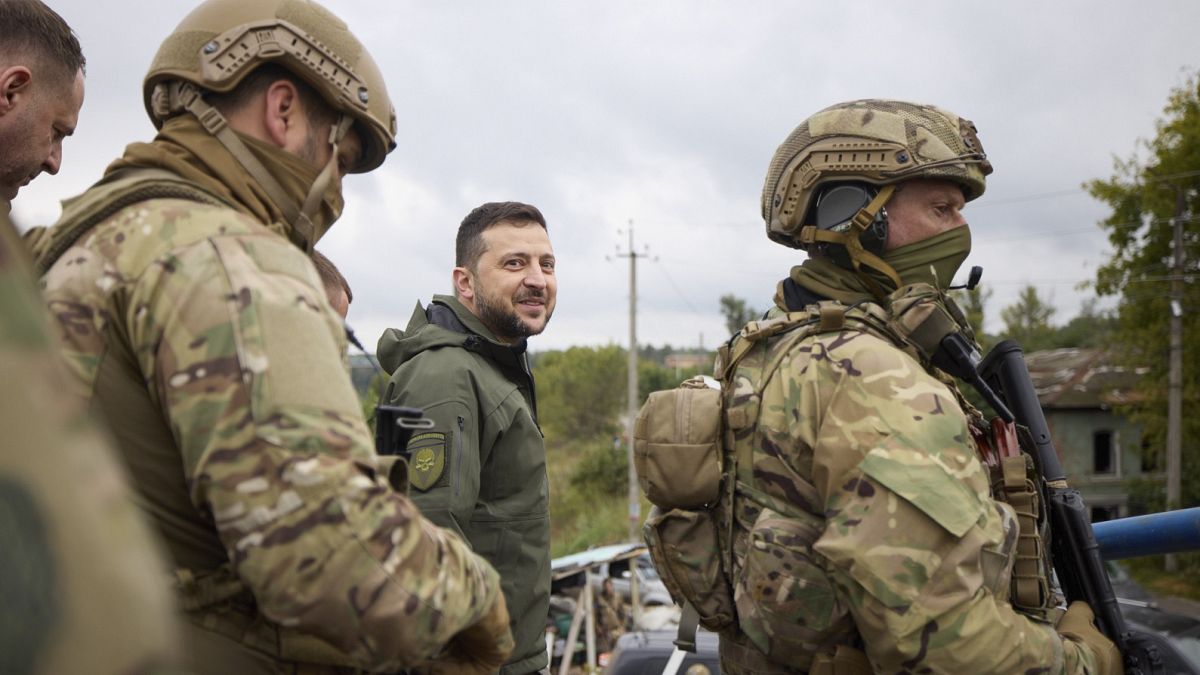Three months after the idea was first floated, European Union plans to invest frozen Russian assets to generate revenues to fund Ukraine's reconstruction appear stalled.
Three months after the idea was first floated, plans by the European Union to invest frozen Russian assets to generate revenues to fund Ukraine's reconstruction appear stalled.
The proposal is described as "deeply problematic" and facing "significant hurdles" by legal experts.
The use of frozen Russian assets was discussed by EU leaders who convened in Brussels on Thursday for an extraordinary summit. Continued support for Ukraine, a regular topic of discussion among leaders since Russia launched its attack nearly a year ago, was made all the more prominent by the presence in Brussels of Ukrainian President Volodymyr Zelenskyy.
In the summit's conclusions, leaders pledged to step up work with international partners "towards the use of Russia's frozen and immobilised assets to support Ukraine's reconstruction and for the purpose of reparation, in accordance with international law."
Estonia Prime Minister Kaja Kallas was among those calling for "a European solution to proceed with the use of frozen assets" as she arrived in Brussels.
"We have been figuring out, as I'm a lawyer by profession, I've been trained to find solutions," she added, suggesting that the EU leverage those assets as part of a settlement between the two warring countries "because Ukraine has a claim towards Russia to repair what they have caused all the damages in Ukraine."
'A few billions for reconstruction
According to an EU official who spoke ahead of the summit, the main idea on the table remains to invest the frozen assets to generate profits and use those only.
"Legally in a sanction regime, you must be able to give that money back when the sanction regime is suspended so you cannot spend it and then find yourself without the money. You can't do that so you need to cover (the frozen amount)," the official said.
About €300 billion of international reserves owned by the Russian Central Bank have been frozen by Western allies since Russia first sent its tanks into Ukraine on 24 February.
Theoretically, assets frozen because of sanctions could remain frozen indefinitely. Unfreezing them would either require the sanctioned individual or entity to successfully challenge the order in court or victims to mount their own legal battles to receive some of the frozen assets as compensation.
"What you can do is to use it and make benefits and use that money and certainly for reconstruction," the EU official insisted. "So if you manage well (the) €300 billion, you can manage a few ones for reconstruction. That's the theory."
The idea to reinvest the money sitting frozen and to use the profits to support Ukraine was first proposed by the Commission in November as part of its "Make Russia Pay" plan. It estimated then that reconstructing Ukraine would require at least €600 billion but the cost is likely to have ballooned since then as Russia subjected Ukraine to relentless missile strikes over the past few months, including on key civilian infrastructure.
Yet nearly three months later, much more still needs to be done on the proposal.
"The first fundamental question is where are the Russian assets? It sounds trivial, but it is a crucial question. There are the central banks, the commercial banks, the exchanges, there are the European Union member states, and all the G7 members," the EU official said.
"We will first do a mapping and we must look at all the obstacles," they said, adding that "some will say there are too many legal uncertainties. and possible legal actions".
'Creative, but legally dodgy plan'
That is the opinion of Evan Criddle, a Professor of Law at the William & Mary Law School in the US, who told Euronews the proposal "would be deeply problematic under international law."
Some countermeasures allowing the use of assets under very specific circumstances can be taken under International law. But "any use or disposition of Russian assets for other purposes, however well-intentioned, such as to generate income that could be used to assist Ukraine, would go beyond the generally accepted purposes of internationally lawful countermeasures," he added.
Russian entities, for instance, could claim that they are entitled to some of the profits generated from the investment of the frozen assets and challenge the decision in both the General Court of the European Union and the European Court of Human Rights, Francis Bond, a leading practitioner on international financial sanctions matters from the Macfarlanes law firm told Euronews.
And then there are practical issues, he said, such as finding an asset manager brave enough to take on the legal liability and public scrutiny that would come from managing frozen Russian assets.
"In addition of course, as the small print always says: the value of your investments may go down as well as up. If the investments lose money, the Commission may find itself in the unenviable position of either guaranteeing Russian assets with public money or inviting a flood of substantial legal actions from the owners of the assets," Bond said.
"If I were serving as legal adviser to the EU and its partners," Criddle concluded, "I would advise against this creative, but legally dodgy plan."
